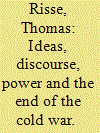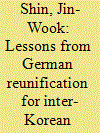| Srl | Item |
| 1 |
ID:
097350


|
|
|
| 2 |
ID:
106346


|
|
|
|
|
| Publication |
2011.
|
| Summary/Abstract |
Reagan's rhetoric and actions in the arms race triggered considerable opposition, which was necessary to establish a counter-discourse in particular through the peace movements in the West, which then impacted upon the discussions in Moscow. It enabled Gorbachev to overcome his considerable domestic opposition and to make the necessary concessions, which started to bring the cold war to an end. In this sense, the peace movements won the cold war, too. The end of the cold war was as much a discursive struggle over ideas about international order and the right mix of deterrence and détente as the East-West conflict itself. It is a matter of good fortune that the cold war had a relatively happy ending and that Europe was reunited. Claiming victory for one side or the other seems to be beside the point, even 20 years later.
|
|
|
|
|
|
|
|
|
|
|
|
|
|
|
|
| 3 |
ID:
128741


|
|
|
|
|
| Publication |
2014.
|
| Summary/Abstract |
In this article I present competing patterns of discursive reconstruction of German reunification in South Korean public spheres and the methods of mobilizing them for domestic debates on inter-Korean relations. I analyze the editorials and opinion articles of two newspapers, Chosun Daily and Hankyoreh, which respectively represent the most influential conservative and progressive print media in South Korea. The articles not only discuss German reunification in contrasting ways but also integrate those interpretive schemes into policy advocacy on North Korea. The conservatives utilized the narratives about the breakdown of the East German regime and the subsequent unification to justify an aggressive policy toward North Korea, whereas progressives consistently judged the German case as "unification by absorption," giving full support to reconciliation and peaceful coexistence.
|
|
|
|
|
|
|
|
|
|
|
|
|
|
|
|